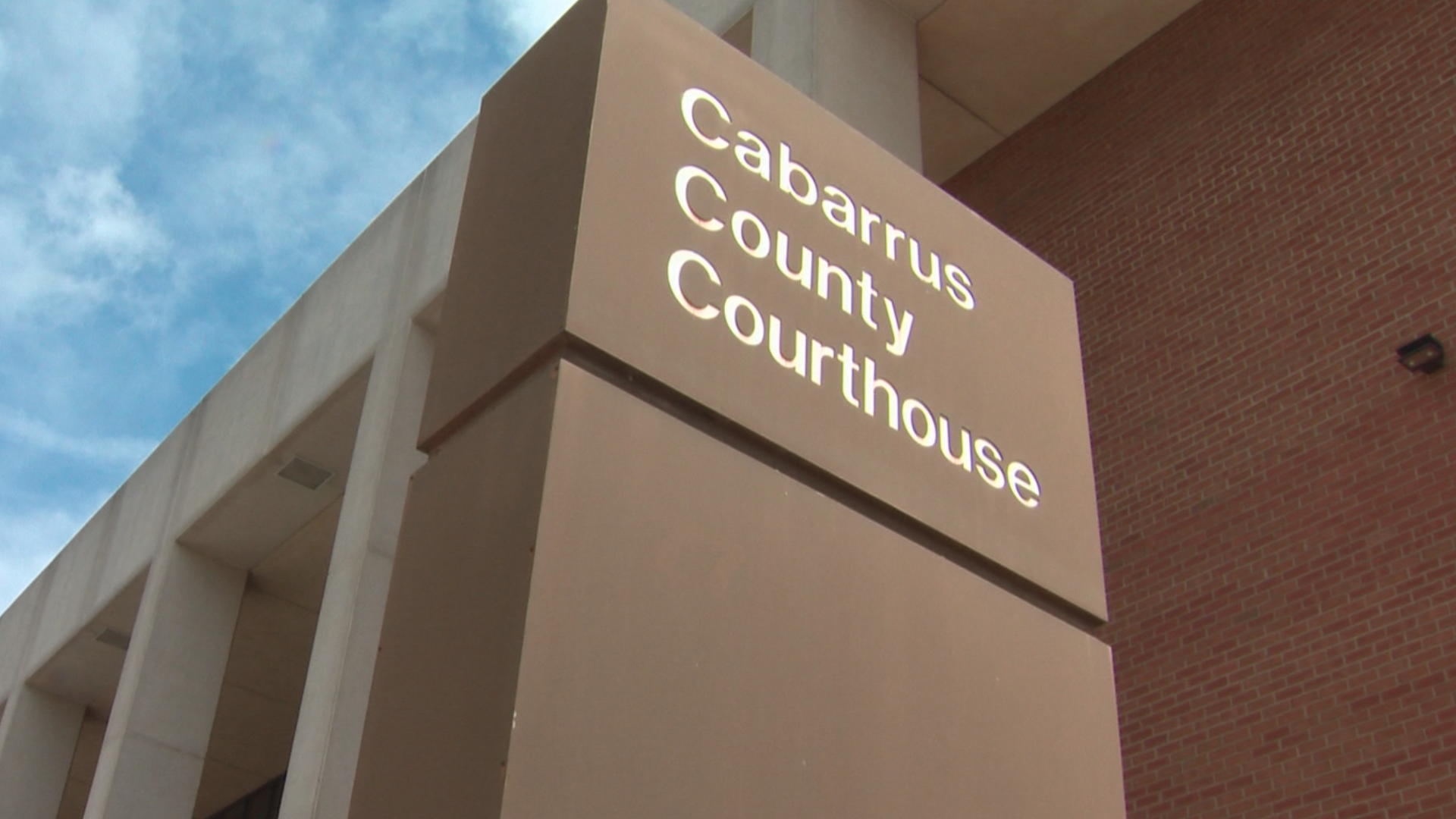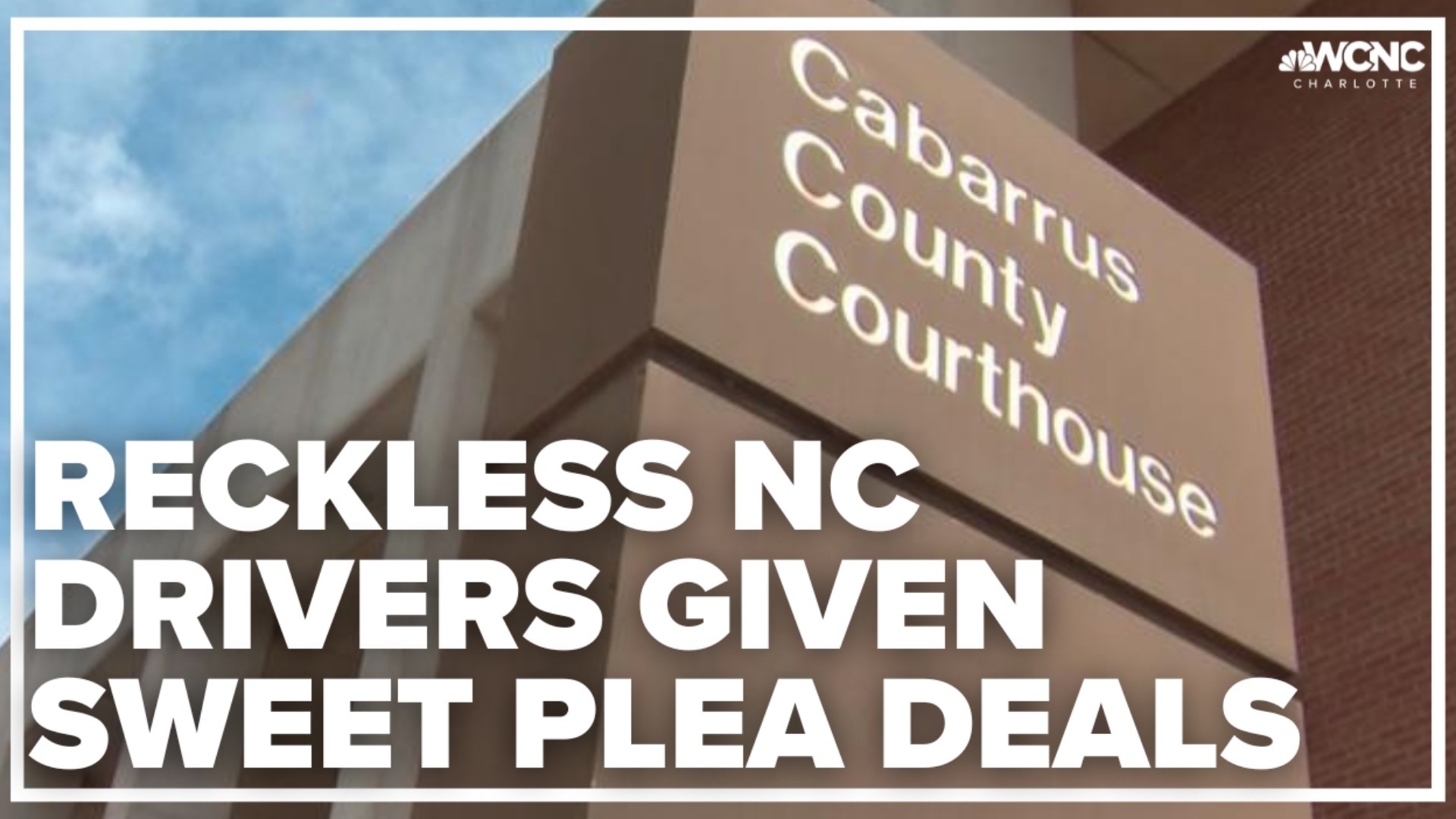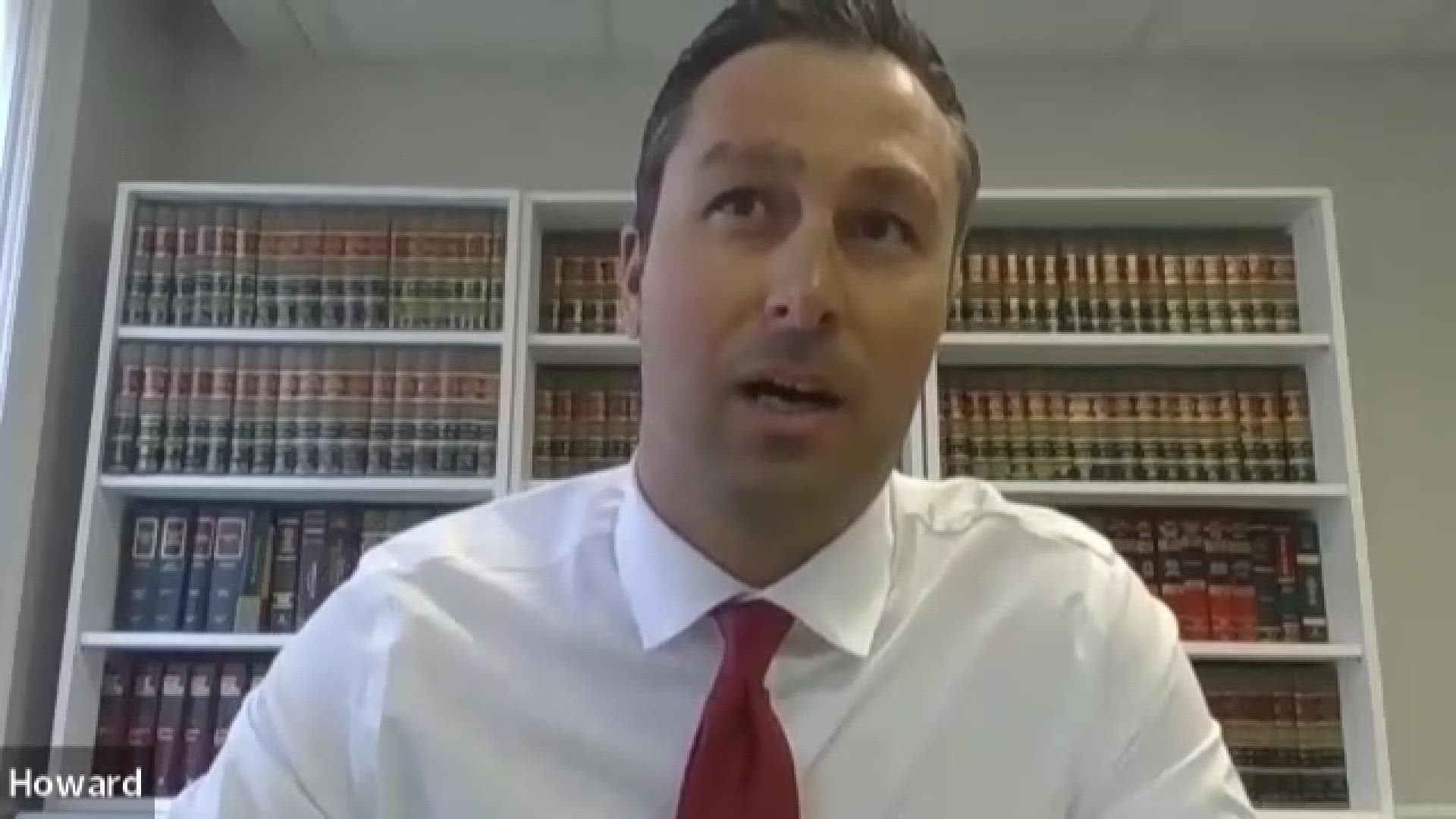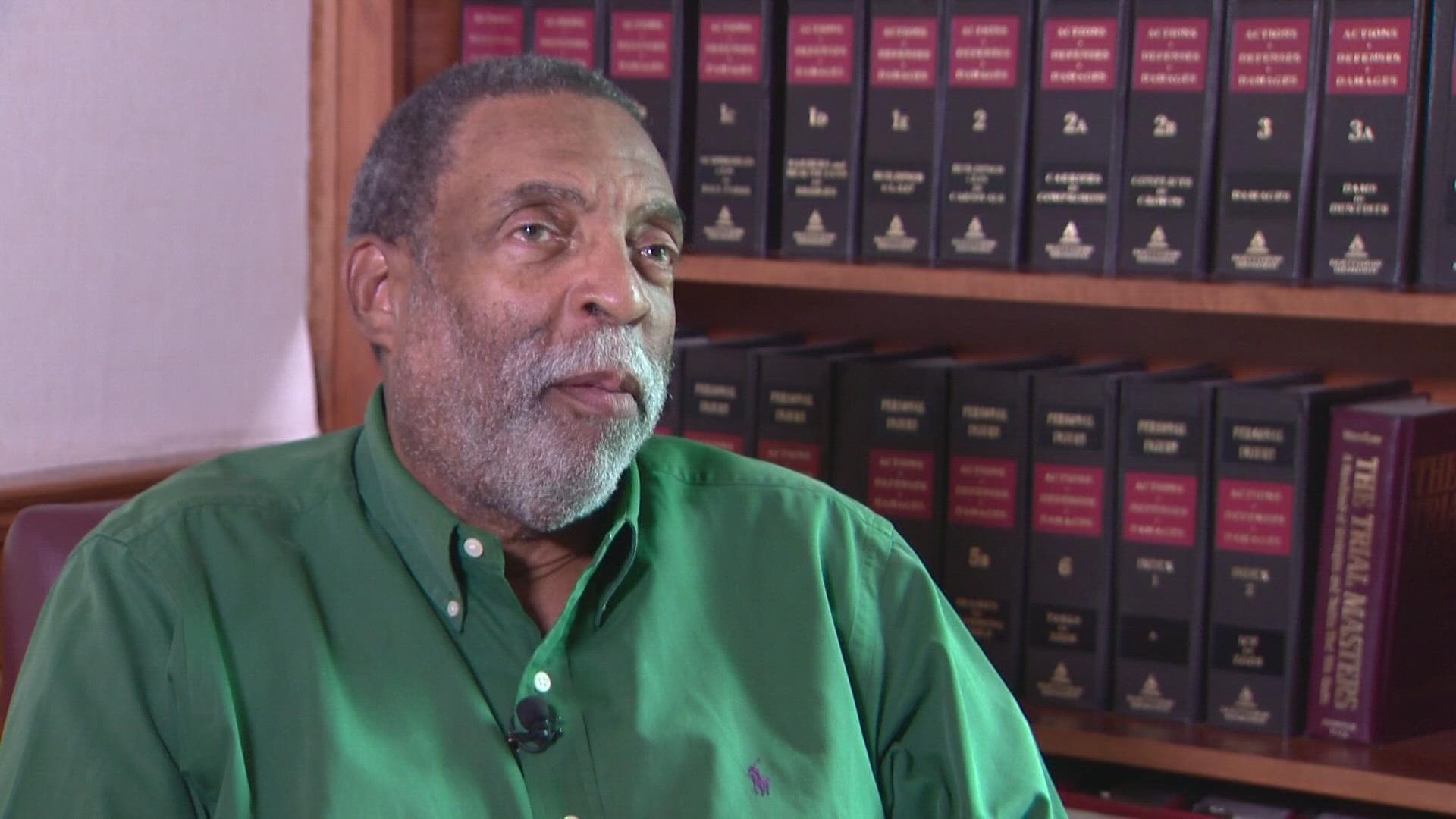Cabarrus County prosecutors gave some accused high-speed drivers sweet deals, formal complaint filed
Despite being pulled over for excessive speed, up to 40 mph over the limit in some cases, defendants drove away with special deals to avoid heavy fines.

Despite being pulled over for driving anywhere from 20 to 40 mph over the speed limit, Cabarrus County prosecutors allowed some defendants to drive away with special deals, a WCNC Charlotte investigation found.
The deals not only allowed drivers to keep their licenses that otherwise might be suspended or revoked, but in some cases they resulted in nothing more than $10 fines.
The practice, which is mostly hidden from public view, resulted in unequal justice, a slap on the wrist for potentially dangerous drivers and a court system shorted thousands of dollars in fines.
These deals are reserved for only certain attorneys, according to an analysis by WCNC Charlotte and an anonymous complaint to the North Carolina State Bar's local liaison. The complaint also alleges these deals occur "off the docket," meaning largely out of public sight. Jay White, the bar counselor in Concord who received the complaint, called the allegations offensive and said they shocked his conscience.


Just another day in traffic court Dozens of folks appear in court for a litany of violations. The cases look the same, but they don't follow the same formula.
Every other Friday morning in front of the Cabarrus County Courthouse, dozens of people line up outside for traffic court.
The doors open a little after 8 a.m. Sheriff's deputies funnel people to the second floor, where officials with the Cabarrus County District Attorney's Office call out each defendant's name to hear their case.
"What can I do for you this morning?" one prosecutor asked a man.
"I got charged with speeding," the defendant said.
"I can take it down to going nine over," the prosecutor told him.
The defendant agreed and the assistant district attorney passed the ticket over to a clerk sitting behind him, who told the man to pay his fine of $200 or so downstairs.
For hours, the same scene played out between the public and the DA's office, but not every case follows that same formula.
Special deals for some, not all
WCNC Charlotte found dozens of excessive speeding cases resolved during the pandemic by way of unusual plea deals. In those cases, drivers admitted only to rear seat belt violations or failure to notify the Department of Motor Vehicles of an address change. Neither non-moving conviction shows up on a defendant's driving record. The disposition of a rear seat belt results in just a $10 fine.
In most of the resolved excessive speeding cases WCNC Charlotte identified, prosecutors also dismissed a reckless driving charge.
"It would concern me if that's the case," Vernon Russell, who's been practicing law in Cabarrus County for decades, said. "It's dangerous."
North Carolina law provides county prosecutors room to negotiate with a defendant or a defense attorney regarding a plea, but prosecutors also take an oath "to have the criminal laws fairly and impartially administered."
"The citizens of the county deserve to be treated equally," Russell said.
Defense attorney Howard Long called the approach to excessive speeding tickets in Cabarrus County rare, "especially if it corresponded with a high speed."
"We would all be up there taking (pleas for) rear seat belts if we could," Long said. "I don't know and I'm not going to speculate, but I think that there's clearly, there's something going on."
WCNC Charlotte spoke to more than half a dozen defense attorneys who represent clients with traffic-related offenses in Cabarrus County. They said they had never asked for or received a rear seat belt or failure to notify DMV plea deal for high-speed or reckless driving cases.
Russell and Long said they're accustomed to either pleading to a speeding or reckless charge, or at best, an improper equipment conviction. An improper equipment conviction does go on a defendant's driving record and carries a more expensive fine.
"I would think it would be out of the realm of reasonableness for an excessive speeding to be reduced to a rear seat belt," Russell said.
"That's ridiculous" One driver thought he got a good deal for his speeding case. He wasn't even close.
Nathaniel Edwards thought he scored a good deal in his excessive speeding case. The 18-year-old, who represented himself, secured an improper equipment conviction instead of his charged 68 mph in a 45 mph zone, according to court records.


He left court on Aug. 19 with a nearly $300 court bill.
"All they are paying is $10? Nah, that's ridiculous," Edwards said. "I'm not going to lie to you, that's ridiculous. I think that's unfair, because some people who have access to better lawyers, obviously, that's more unfair to the people who can't afford to make that change."
One attorney received nearly 70 of these "special" deals
WCNC Charlotte's analysis of court records identified nearly 70 such deals alone for one defense attorney in particular. Off camera, Todd Williford said everyone gets these deals and they're "no big deal." On camera, he declined to comment.
Campaign finance records show Williford is the top donor to date for Assistant District Attorney Beth Street's district court judge campaign. Street, who did not respond to WCNC Charlotte's requests for comment, is listed as the prosecutor of record in at least two dozen of Williford's rear seat belt and failure to notify DMV dispositions.
In one of their cases, court records show a man charged with speeding 95 mph in a 55 mph zone drove away with a failure to notify DMV conviction in September 2021. As a result, prosecutors also dismissed his reckless driving charge, a court document revealed.
An early retirement for the DA Roxann Vaneekhoven retired early and refused to answer questions on camera about the plea deals in question.
District Attorney Roxann Vaneekhoven, who retired Aug. 31, refused to answer WCNC Charlotte's questions on camera, but in statements over the course of several weeks said, “dozens of attorneys and hundreds of citizens received pleas that were not traditionally given,” due to pandemic-related court limitations.


The outgoing DA maintained the excessive speeding and reckless driving cases WCNC Charlotte cited make up less than 1% of all of the county's traffic cases. In her statement, Vaneekhoven also lumped together all non-moving violations, even though improper equipment carries a more significant fine and appears on a person's driving record. She added excessive speeding defendants are treated equally.
"An audit of thousands of traffic cases during the COVID-19 epidemic showed nearly all defense attorneys that practice in Cabarrus County received reductions to non-moving traffic violations," she said in one statement. "Moreover, hundreds of unrepresented citizens with traffic cases also received greatly reduced charges to non-moving violations. From the DA’s Office perspective, we do not differentiate one non-moving violation from another. Nor does the DA's Office consider the fine or fee associated with any traffic case. For example, failure to notify, improper equipment or a seat belt violation, all have the same effect on a person’s driving record with zero points. These types of non-moving violations were given to a multitude of defense attorneys AND unrepresented citizens during the COVID-19 epidemic. The District Attorney’s Office does not order, assess, or collect fines or fees that are taxed to everyday citizens that have the misfortune of getting a traffic ticket."
The district attorney provided the referenced "audit" at WCNC Charlotte's request. While the spreadsheet shows dozens of excessive speeding cases reduced to improper equipment convictions with reckless driving charges dismissed, the audit does not identify excessive speeding defendants or a variety of attorneys who secured rear seat belt or failure to notify DMV dispositions.
WCNC Charlotte reviewed hundreds of cases from two traffic court dockets in June and August and could not identify a single defendant who represented themselves and still negotiated a rear seat belt or failure to notify DMV conviction.
In a statement to WCNC Charlotte, Vaneekhoven, who did not run for re-election, said she reached out to the governor's office the week after the primary to make plans for her retirement at the end of summer. Her term runs through December.
"My retirement was set in motion in May of this year," Vaneekhoven told WCNC Charlotte. "I have served the citizens of Cabarrus County for 27 years and look forward to my retirement."
Gov. Roy Cooper appointed District Attorney-Elect Ashlie Shanley as the new district attorney in Cabarrus County last week. Shanley, who takes over on Sept. 1, is currently the county's Chief Assistant District Attorney pending the results of her unopposed election on Nov. 8.
"Ms. Roxann Vaneekhoven is the District Attorney of Cabarrus County," she said in response to WCNC Charlotte's questions. "Any questions regarding cases disposed of during her tenure should be directed to Ms. Vaneekhoven."
"That's not good" In one case, a driver cited for going 80 in a 65 mph zone. State officials confirmed there's no 65 mph posting on that highway.
Aside from the special plea deals, WCNC Charlotte's team also found at least two cases in which prosecutors cited speed limits that the Department of Transportation confirmed don’t actually exist on roads where defendants were driving.


In the above document, a law enforcement officer cited the driver for going 105 mph in a 55 mph zone on Highway 49 in Cabarrus County. Prosecutors wrote "speed 80 in 65" under what the defendant agreed to plead guilty to as a lesser charge, according to a court document. An NCDOT representative said "there's not a 65 mph posting anywhere" on Highway 49. Court records show prosecutors also dismissed the man's reckless driving charge.


Another prosecutor changed the speed limit in a charging document earlier this summer. An officer cited the driver for speeding 78 in a 35 mph zone, as well as failing to have a license. Prosecutors changed the speed to "64/55," meaning the defendant pleaded guilty to speeding 64 mph in a 55 mph zone, according to a court document. Records show prosecutors dismissed a reckless driving charge as well.
Martin Luther King Jr. Avenue, the road where the infraction allegedly occurred, does not have a 55 mph zone, according to NCDOT.
"That's not good," Russell said. "That's not good."
Vaneekhoven defended the practice.
"Prosecutors are given statutory authority to amend pleading (including speed zones) prior to or after final judgment," she said in a statement. "In fact, prosecutors all over the state amend charges so often that the Administrative Office of the Courts has issued a form to use when amending charges."
Court records show prosecutors used a dismissal notice of reinstatement form in the above two cases.
Troopers did their part
North Carolina Highway Patrol Sgt. Chris Knox said troopers, who were responsible for most of the excessive speeding and reckless driving tickets, did what they could to keep the roads safe.
"We have made our step in holding someone accountable," he said. "We're not responsible for that punishment or that accountability."
Vernon Russell questioned the deals from an enforcement point of a view.
"I would consider it unreasonable even if you offered it to everyone," the attorney said. "Essentially, what is law enforcement working for if you want safe roads and safe highways? You would want some enforcement mechanism with respect to behavior on the highways and it would seem that if you're going to take an excessive speed and reduce it to no sanction at all, that would not be safe for the community at large, so I wouldn't support that."
Final words
The soon-to-be-retired district attorney said her office has maintained a mission that prioritizes "the most serious cases and most violent offenders who violate innocent victims."
"Unlike other districts, we did not summarily dismiss all speeding tickets, or agree to release violent offenders from jail, or take mass dismissals of misdemeanor and felony cases," Vaneekhoven said. "Our community has continually expressed their gratitude to the District Attorney’s Office and other courthouse personnel for the judicious way we have addressed the caseload, backlog, and limited court schedules during the COVID-19 pandemic."
For comparison, the Mecklenburg County District Attorney's Office told WCNC Charlotte it's not the office's policy or practice to offer failure to notify DMV or rear seat belt pleas as reductions in speeding cases.
"When we have the evidence and witnesses to prove a speeding violation involving excessive speeds (25+ mph over the speed limit), we insist upon pleas to speeding violations," Community Liaison Coordinator Meghan McDonald said.
What's next?
Jay White said, after talking with prosecutors, he would pass along any information he collects to the North Carolina Bar. White told WCNC Charlotte he has an ethical obligation to report a violation to the state bar.
A spokesperson for the state bar told WCNC Charlotte, "Whether the State Bar received a complaint or is conducting an investigation is confidential and is not a public record."
WCNC Charlotte's investigation into special excessive speeding deals in Cabarrus County started with a tip. If you have something you want us to investigate, email nmorabito@wcnc.com




